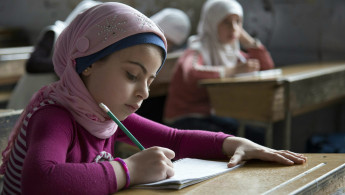Syria's education crisis: 2.7 million children out of school
Syria's education crisis: 2.7 million children out of school
As children around the world start a new school term this week, Syria's youngsters miss out on a vital education which could lift them out of poverty.
2 min read
Syria is in the depths of an education crisis [Getty]
Smartly-dressed with a backpack full of books and new friends to make, millions of children across the world returned to school this week.
But for youngsters trapped in conflict zones or spending their childhood in refugee camps, there is no back-to-school feeling.
The number of children uprooted from their homes as a result of war, poverty and persecution has reached a record 50 million worldwide, according to the latest report from UNICEF.
In 2015, youngsters from Syria and Afghanistan accounted for 45 percent of displaced children.
The toll of the Syrian civil war, now in its sixth year, has inevitably plunged the country into an education crisis.
Data shows that in Syria alone, 2.1 million children aged between five and 17 are out of school.
Yet even neighbourhoods with schools which have withstood the bombardments may find few children on roll, with families unable to afford the cost of transport, or children being forced to work to make ends meet.
An additional 600,000 Syrian children living as refugees in the surrounding region are not receiving an education.
Despite the obliteration of schools and collapse of its education system, Syria is outside the top 10 countries with the highest rates of children missing out on primary education.
The data from UNICEF highlights the effect on education in countries blighted by conflict, natural disasters and extreme poverty.
Liberia is home to the highest proportion of out-of-school children with nearly two-thirds of primary-aged children not attending school.
The second highest is South Sudan, where 59 percent of children are missing out and one in three schools is closed due to conflict.
Afghanistan follows, with 46 percent of children denied an education.
Despite a 126 percent increase in education requirements in 2005, UNICEF says its funding has increased just 4 percent.
Humanitarian agencies received only 31 percent of funding needs, down from 66 percent a decade ago.
Attending school can help children cope with the mental effects of war, as well as safeguard vulnerable youngsters from extremist ideas, says UNICEF's education chief Jo Bourne.
"For countries affected by conflict, school equips children with the knowledge and skills they need to rebuild their communities once the crisis is over, and in the short-term it provides them with the stability and structure required to cope with trauma,” she said.
“Schools can also protect children from the trauma and physical dangers around them. When children are not in school, they are at an increased danger of abuse, exploitation and recruitment into armed groups.”
But for youngsters trapped in conflict zones or spending their childhood in refugee camps, there is no back-to-school feeling.
The number of children uprooted from their homes as a result of war, poverty and persecution has reached a record 50 million worldwide, according to the latest report from UNICEF.
In 2015, youngsters from Syria and Afghanistan accounted for 45 percent of displaced children.
The toll of the Syrian civil war, now in its sixth year, has inevitably plunged the country into an education crisis.
Data shows that in Syria alone, 2.1 million children aged between five and 17 are out of school.
Yet even neighbourhoods with schools which have withstood the bombardments may find few children on roll, with families unable to afford the cost of transport, or children being forced to work to make ends meet.
An additional 600,000 Syrian children living as refugees in the surrounding region are not receiving an education.
Despite the obliteration of schools and collapse of its education system, Syria is outside the top 10 countries with the highest rates of children missing out on primary education.
 |
Schools can also protect children from the trauma and physical dangers around them. When children are not in school, they are at an increased danger of abuse, exploitation and recruitment into armed groups |  |
Liberia is home to the highest proportion of out-of-school children with nearly two-thirds of primary-aged children not attending school.
The second highest is South Sudan, where 59 percent of children are missing out and one in three schools is closed due to conflict.
Afghanistan follows, with 46 percent of children denied an education.
Despite a 126 percent increase in education requirements in 2005, UNICEF says its funding has increased just 4 percent.
Humanitarian agencies received only 31 percent of funding needs, down from 66 percent a decade ago.
Attending school can help children cope with the mental effects of war, as well as safeguard vulnerable youngsters from extremist ideas, says UNICEF's education chief Jo Bourne.
"For countries affected by conflict, school equips children with the knowledge and skills they need to rebuild their communities once the crisis is over, and in the short-term it provides them with the stability and structure required to cope with trauma,” she said.
“Schools can also protect children from the trauma and physical dangers around them. When children are not in school, they are at an increased danger of abuse, exploitation and recruitment into armed groups.”
 |
|



